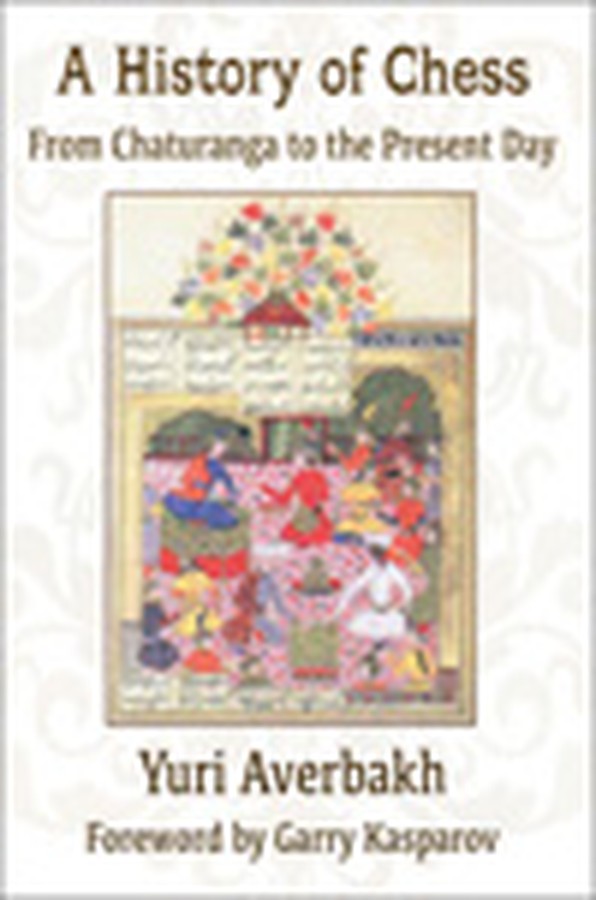| Utgivelsesdato | Desember 2012 |
| Forfatter | |
| Pris | 180 NOK |
A History of Chess
From Chaturanga to the Present DaySjakkverdenens superveteran har 90 år gammel skrevet en konsentrert historie om sjakkspillets historie - mest fram til år 1500, og bare et kort resymé av fortsettelsen. En liten, men verdifull og leseverdig bok med mange fine fargebilder.
Dette er vel å merke ikke en kjent sjakkstormester med lyst til å lage en bok om sjakkhistorie, men av de dyktige sjakkhistorikerne som gir innsikt i status og egne meninger om forskningen rundt særlig det krevende temaet hvor sjakkspillet kommer fra. Som vi ser allerede av innholdsfortegnesen, er vi da i India og nære omegn, men han har likevel ikke sammenfallende syn på dette med den store sjakkhistorikeren for hundre år siden, professor Murray med sitt storverk - også "A History of Chess" - som utkom i 1913.
Innhold
- Introduction by Yakov Shraiberg 4
- Foreword by Garry Kasparov 5
- From the Author 8
- India 11
- Iran and the Arab Caliphate 36
- Armenia 42
- Nepal 44
- Western Europe 45
- The Exchequer 50
- Chess Pieces in Europe 52
- Italy 53
- France 53
- England 54
- Scandinavia 54
- Poland 54
- The Church and Chess 54
- The Einsiedeln Manuscript 57
- Cherchez la Femme 58
- A Sermon on the Subject of Chess 63
- Russia 66
- Chess Reform 69
- The Hyderabad Manuscript 71
- Epilogue 79
- Notes 83
- Bibliography 88
I FORORDET forteller Garry Kasparov om den unike sjakkpersonligheten Averbakh:
A Distinguished Edcucator
The more recent history of chess as a cultural phenomenon, which permeates all the spheres of social life, is obscured for young chessplayers by the current computer boom and dominant competitive factor. This quite different nature of chess as a part of human culture goes back centuries, and is especially clearly seen over the last 400-500 years, when the development of the game coincided with the rise of certain nations. Undoubtedly, the best chess masters of each epoch were closely associated with the values of the society in which they lived and worked; their chess styles and ideas reflected all the changes of their cultural, political and psychological background.
Today there are very few people representing these century-old traditions. One of the very few is the world’s oldest grandmaster, Yuri Lvovich Averbakh, who has long been an important figure in world chess, the living incarnation of its inseparable connection with social and cultural life. The interests of this exceptionally erudite and multifaceted man always extended far beyond the chessboard. Let me remind you that Averbakh was a very strong chessplayer, a participant in two interzonal tournaments (1952 and 1958) and the famous candidates tournament in Zürich (1953). His success in the national championships, including his win in 1954 and tying for 1st-3rd places in 1956 reflected the strength of his game. Nobody could become the USSR champion by chance! Probably, his achievements would have been higher had not such notables as Keres, Smyslov, Bronstein, Petrosian, Geller, Spassky, Tal, and Kortschnoi stormed the chess Olympus during his best years...
Yuri Lvovich gradually moved on to other types of chess activity. He became a coach, a journalist, a writer, a historian, and since 1962, he has headed the magazine Shakhmaty v SSSR. By that time Averbakh was already known as a leading theoretician in the endgame. His fundamental multi-volume work Chess Endings and the popular paperback Chess Endings: Essential Knowledge have taught generations of chessplayers. His approach to the endgame study, as well as the other aspects of chess, was always very thorough and scientific. As the result dozens of typical positions are inextricably linked with his name. Abroad he was even nicknamed “Mr. Endgame.” I still remember how we were told in the Baku Pioneer Palace that, in the endgame, we must study Averbakh. His contribution to opening theory is also remarkable. He developed an original plan against the King’s Indian Defense, appropriately called the Averbakh System.
In the 1970s and 80s, for a good fifteen years, he hosted the weekly TV show Chess School, which had no equivalent in the world. In houses across the country you could hear a funny song (a parody of another program) with the following lines: “It’s just one step from the great to the ridiculous: Chess School is hosted by Averbakh.”
In addition, Yuri Lvovich held prominent positions in the national and international chess federations. He is a respected arbiter, and was the chief arbiter, in particular for my matches with Karpov (1984/85), Short (1993), and Kramnik (2000), as well as the world Olympiad (1994) and the FIDE world championship (2001). It is hard to recall a major chess event that survived without his participation. Perhaps no other prominent chessplayer of the 20th century had such a rich creative life. This amazing versatility makes Averbakh so unique in the history of modern chess. There was no player with such encyclopedic knowledge of the chess game after the Second World War.
Averbakh’s name is also especially memorable to me because he was the very first grandmaster that I defeated. It was in the clock simul during the national tournament between the Pioneer Palaces (1974). Admittedly, I got lucky: the game was adjourned when I had an extra pawn, and the adjudicator awarded me the victory, even though winning would not easy and I doubt that I, then not yet 11- years old, would have been able to defeat Averbakh himself. Then at the USSR team cup in 1982 I was able to beat Yuri Lvovich in a complicated endgame with a rook, a bishop and five pawns against a rook, a knight and four pawns (all the pawns were connected), and I was very proud of this victory over a renowned endgame expert.
It is therefore no wonder that such an encyclopedic mind has always had a desire not just to understand the roots of the certain historical events (he is the author of the fIt is therefore no wonder that such an encyclopedic mind has always had a desire not just to understand the roots of the certain historical events (he is the author of the fascinating book In Search of Truth), but also to solve the mysteries of chess and connect the development of chess to the evolution of humanity as a whole. This is, of course, is an extremely difficult task and no one could do it until now. But who if not Averbakh was the best equipped to undertake such an enormous project! Maybe not everything in this groundbreaking book is indisputable, but it, no doubt, fits well with the life and work of Yuri Averbakh, the outstanding chess educator of today.
Garry Kasparov
| Innbundet? | Nei |
| Type | Bok |
| Språk | Engelsk |
| Antall sider | 88 |

